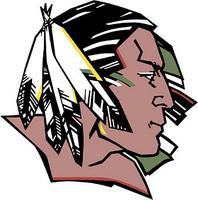 The "Fighting Sioux" logo of the University of North Dakota. ™ UND. |
"Although the University of North Dakota maintained that its logo and nickname are used with consummate respect, the position of the namesake tribes and those affected by the hostile or abusive environment that the nickname and logo create take precedence," Bernard Franklin, the senior vice president for governance and membership. "The decision of a namesake sovereign tribe, regarding when and how its name and imagery can be used, must be respected even when others may not agree."
Franklin, however, said UND will still be allowed to host an ice hockey championship in March 2006 without being forced to cover up the thousands of Indian head logos at the Ralph Engelstad Arena. The NCAA said it was "not reasonable" to require the school to comply with this portion of the mascot policy for the previously scheduled playoffs. The decision brought praise from David M. Gipp, a UND alumnus who serves as president of the United Tribes Technical College. As a leading opponent of the "Sioux" name, he said the school must work with tribes to choose a symbol that is not offensive to Native people. "Now's the time to work with the tribes to form a strategic plan for how to make that change," Gipp said in a statement yesterday. "Complying with the NCAA is the first step in a process to help UND become the premier, American Indian serving institution it claims to be. As long as this is unresolved, UND will not be supported and recognized for the value of its contributions through its American Indian programs, as it should be." UND President Charles Kupchella, however, vowed to appeal to the NCAA executive committee and said legal action in court was possible. He questioned why three other schools have been taken off the list but didn't mention tribal opposition to the nickname and logo. "Even those here opposed to the use of the nickname on campus recognize that UND offers perhaps the best opportunity for many American Indian students to get an education," he said in a statement. "I would also note, that the schools exempted thus far have been exempted on the basis of a 'special relationship' with American Indian tribes, yet our proportionate number of American Indian students and the number of substantive programs in support of American Indian students exceeds that of all of the exempted schools combined." Of the four schools that have brought appeals, UND is the only one to have been denied. The Florida State University "Seminoles," the University of Utah "Utes" and the Central Michigan University "Chippewas" were taken off the list after the local namesake tribes expressed support for their respective mascots and logos. A fifth institution, the University of Illinois, is expected to seek an exemption for its "Chief Illiniwek" mascot. But like UND, the school, can't point to clear tribal support for the controversial symbol. A total of 18 schools were placed on the NCAA's list when the mascot policy was announced on August 5. Most haven't stated their plans but at least one school, Midwestern State University in Texas, has already decided to give up its "Indians" nickname rather than fight. The policy doesn't require any school to give up its mascot, nickname or logo -- it only bars the use of Indian imagery during post-season tournaments. Schools that choose to keep their Indian symbols won't be allowed to host playoffs in the future. Previously scheduled games will still occur as long as Indian imagery isn't displayed. UND was re-examining the use of "Fighting Sioux" in 2000 when the North Dakota Board of Higher Education ended the debate by voting to keep the name. The move came after Ralph Engelstad, a wealthy UND alumnus, threatened to withdraw financial support for the school, and the arena that was still under construction, if the name was dropped. Engelstad, a Las Vegas casino owner, died in 2002, but not before seeing the opening of "The Ralph," as the $100 million arena is known. He purposely had thousands of Indian heads placed throughout the facility and placed a sculpture of an Indian warrior riding a horse out front. Engelstad "dedicated" it to Sitting Bill, the revered Lakota leader. Most Native American students and alumni at UND, along with Native and non-Native faculty, oppose the nickname and logo. But the overwhelming majority of non-Native students and alumni support the name. NCAA Decision:Statement by NCAA Senior Vice-President for Governance and Membership Bernard Franklin on University of North Dakota Review(September 28, 2005) NCAA Policy:
NCAA Executive Committee Issues Guidelines for Use of Native American Mascots at Championship Events (August 5, 2005) Relevant Links:
University of North Dakota - http://www.und.edu
The Ralph - http://www.theralph.com
Fighting Sioux - http://www.fightingsioux.com
NCAA Minority Opportunities and Interests Committee - http://www1.ncaa.org/eprise/main/
membership/governance/assoc-wide/moic/index.html
National Coalition on Racism in Sports and Media - http://www.aimovement.org/ncrsm
